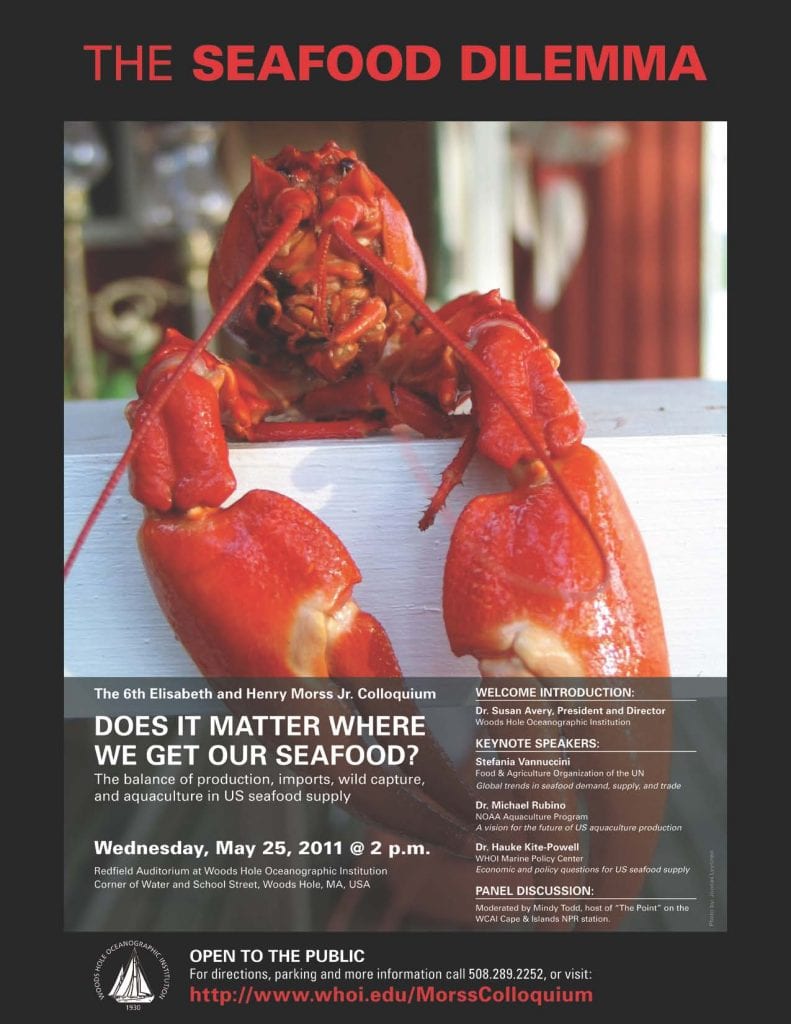WHOI to Host Public Forum on Seafood Security
May 20, 2011
The Woods Hole Oceanographic Institution (WHOI) will host a public forum on May 25 from 2 p.m. to 5 p.m. in Redfield Auditorium on the theme:
The Seafood Dilemma: Does it Matter Where We Get Our Seafood?
The Balance of US Production, Imports, Wild Capture, and Aquaculture in US Seafood Supply.”
The program, which is preceded by a day-and-a-half long scientific workshop on various aspects of the subject, will feature keynote talks by:
Stefania Vannuccini
Food and Agriculture Organization of the United Nations. “Global trends in seafood demand, supply, and trade”
Dr. Michael Rubino
NOAA Aquaculture Program. “A vision for the future of US aquaculture production”
Dr. Hauke Kite-Powell
WHOI Marine Policy Center. “Economic and policy questions for US seafood supply”
The talks are followed by a panel discussion moderated by Mindy Todd, host of “The Point,” a program on WCAI, the Cape and Islands NPR station.
The program will explore whether the US should adopt policies to change the way the nation procures its seafood supply. Currently the US imports more than 80% of its seafood, about half of it farmed in countries ranging from Asia to South America.
“The US trade deficit related to seafood last year was approximately $10 billion,” Hauke Kite-Powell, a research specialist in WHOI’s Marine Policy Center. “There are economic, health, and environmental ramifications to the import of cultivated fish, as well as questions about the future stability of the supply. Seafood consumption is rising more quickly abroad than it is here in the United States. Should we take active steps to prepare for a future when international supplies may not be as readily available as they currently are? Our program will explore all of these issues.”
After growing for two decades at about 5%/year, US aquaculture production peaked at slightly above 400,000 metric tons/year in 2002‐2003, Kite-Powell notes. It has since declined to about 350,000 metric tons/year. “US aquaculture output has contracted in recent years, and represents less than 10% of all US commercial fisheries production,” he says. “By contrast, for the world as a whole, aquaculture now accounts for half of all seafood production, and this share continues to rise,” he adds.
“The objective of this Morss Colloquium is to engage experts on fisheries, aquaculture, and the seafood industry in an effort to clarify the economic significance and implications of the US seafood trade deficit,” Kite-Powell wrote in his proposal for the colloquium. “To what extent does the trade deficit represent an economic loss (or threat of future loss) for the United States? Are there legitimate economic welfare arguments for a federal policy to reduce this trade deficit? And if so, what role can US aquaculture production play in achieving that reduction? Similar questions arise at the local scale: many coastal towns (including Falmouth) are grappling today with questions about permitting and encouraging more aquaculture in their waters.”
The program is part of the Morss Colloquia series at Woods Hole Oceanographic Institution. A generous gift by Elisabeth W. and Henry A. Morss, Jr. has allowed the Institution to establish a fund to support public colloquia on issues of global importance that confront the human race.
Colloquia are intended to go beyond routine scientific meetings, to expose the Institution’s staff and public community to new issues and new perspectives that cross disciplinary boundaries between the sciences and social sciences.
The Woods Hole Oceanographic Institution is a private, independent organization in Falmouth, Mass., dedicated to marine research, engineering, and higher education. Established in 1930 on a recommendation from the National Academy of Sciences, its primary mission is to understand the ocean and its interaction with the Earth as a whole, and to communicate a basic understanding of the ocean’s role in the changing global environment.

